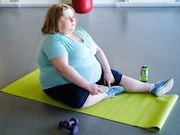Tag: Depression
Objectively Assessed Exercise Protective Against Depression
Objectively assessed, but not self-reported, physical activity protects against major depressive disorder
Assessing Symptoms After 4 Weeks of Psychotherapy Helpful in Teens
Week 4 seems better than week 8 for assessing response, implementing treatment augmentation
Recalling Positive Memories May Cut Depression Risk for Teens
In teens with early-life stress, positive memory specificity linked to lower depressive symptoms
Depression Tied to Worse Asthma Outcomes in Urban Teens
More than a fourth with asthma reported depressive symptoms, greater symptom severity
Higher Risk for Depression, Anxiety Seen With Cerebral Palsy
Association seen in patients with cerebral palsy without accompanying intellectual disability
Pediatricians Have Role in ID’ing Postpartum Depression
Routine screening should be integrated into well-child visits at 1, 2, 4, and 6 months of age
For Teen Girls, Depression May Predict Subsequent Alcohol Use
Depression severity predicts increased likelihood of alcohol use; link for reverse pathway inconsistent
Limiting Social Media May Improve Psychological Well-Being
Limiting exposure to 30 minutes per day cut loneliness and depression in undergraduates
Genetic Analysis Shows Higher BMI May Up Risk for Depression
Findings based on large study assessing genetic causal link, even without metabolic effects
In-Person Social Contact Tied to Reduced Psychiatric Symptoms
For veterans, social interaction in person, not on Facebook, tied to lower risk for depression, PTSD














